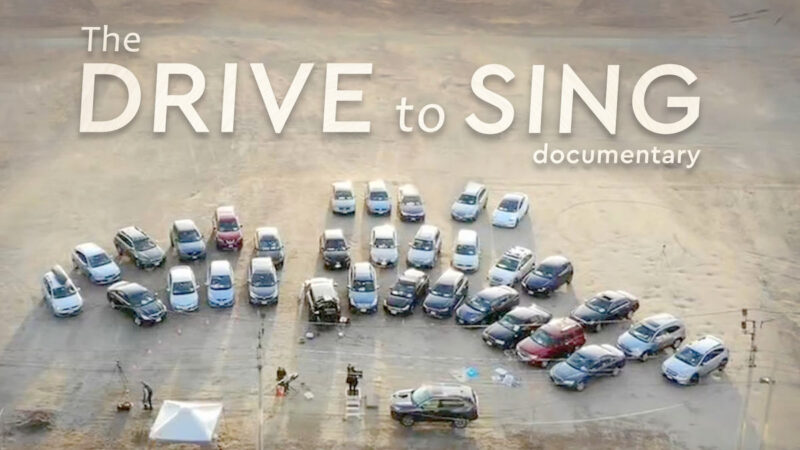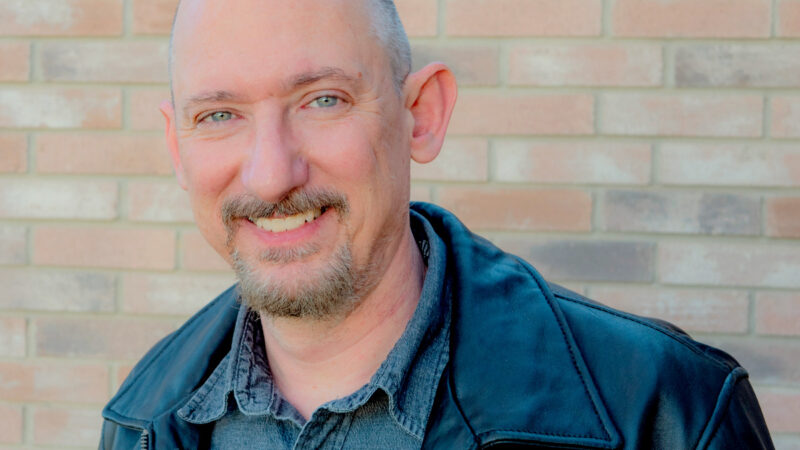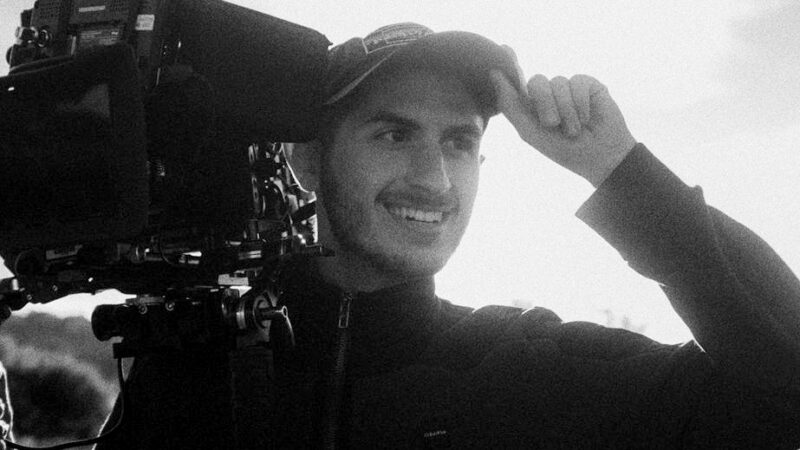
An Industry Case Study
Narrative | Dramatic Features
Film Name: CATHARSIS
Genre: Drama
Length of film: 16 minutes
Date: December 5th 2021
Director: Lawrence Watford or Lawrence “LAW” Watford
Producer: Lawrence “LAW” Watford, Mario “Master U” Jackson, Bobby DeJesus, Genia Lear Morgan, Jack Manning III, Tiffany Elle Burgess
Writer: Lawrence Watford or Lawrence “LAW” Watford
Cinematographer: Mario Jackson, Mario “Master U” Jackson
Production Company: Divine Write Pictures, Tyler Street Films
Budget: Approx $3000
Financing: Self financing – provided by Lawville Solutions – the parent company to Divine Write Pictures
Shooting Format: Divine Write Pictures
Screening Format: Digital
World Premiere: Digital
Awards: NA
Website: www.divinewritedigital.com
The Official Trailer for CATHARSIS
Watch The Trailer for CATHARSIS directed by Lawrence Watford
A Short Biography of Lawrence Watford
Brooklyn filmmaker Lawrence “LAW” Watford is known for making dramatic films that are deeply focused on our common humanity. While having the opportunity to work with Hollywood icons like Pat Morita (The Karate Kid) and James Avery (The Fresh Prince of Bel-Air’s Uncle Phil) whom he directed in his 2005 short film “A Christmas Wish.”
After graduating, LAW began working on major Hollywood productions like the Oscar nominated films “The New World,” “Revolutionary Road” and “The Good Shepherd,” (directed by Robert DeNiro) before landing in the art department of the hit NBC series “Law & Order: SVU,” where he worked for 5 seasons.
He’s worked diligently as a filmmaker, focusing on dramas through Divine Write Pictures. In 2013 he wrote, directed and produced the short film “The Savior & the Samaritan,” and “Flipped” in 2018. His latest, “Catharsis” explores accountability in law enforcement. Following a successful run on the festival circuit, the film was recently acquired by Revolt TV.
The Lawrence Watford Interview
indieactivity: Tell us about “who you are“?
Lawrence Watford (LW): I’m a husband, father, storyteller, filmmaker and avid political junkie. I grew up in Brooklyn New York before moving to VA, which is where I discovered an interest in filmmaking.

Introduce your film?
Lawrence Watford (LW): Catharsis is, what I refer to as, “social justice cinema”. It’s the story of a black woman who confronts the ambitious District Attorney that refused to bring charges against the NYPD officer responsible for her son’s death. To describe it at “timely” is an understatement, as there has never been a period where cases of racially motivated police violence against black Americans wasn’t an issue or topic of the day. The film’s tone is intentionally and necessarily dark in it’s desire to communicate the level of fear, anger and pain required to move the viewer to consider the possibility that this can one day happen in real life.
Tell us why you chose to write, produce, direct, shoot, cut/edit the movie? Was it financial, chance or no-budget reason?
Lawrence Watford (LW): On the film, I wore a number of hats (including editor) not so much out of financial necessity as it was a matter of me being a tactile filmmaker, particularly as pertains to the editing process. I need to physically compare and swap out takes and trim shots to create the timing that feels just right. I feel like I would drive an editor crazy trying to communicate the nuances of what’s in my mind on certain films.
Introduce your crew?
Lawrence Watford (LW): I could never have pulled off this film without the support and faith of a dedicated crew who believed in the vision for the project. Obviously, my two co-producers/actors Genia Lear Morgan and Bobby DeJesus served as defacto crew members, stepping in to meet any production need that we didn’t know we needed until it was needed.
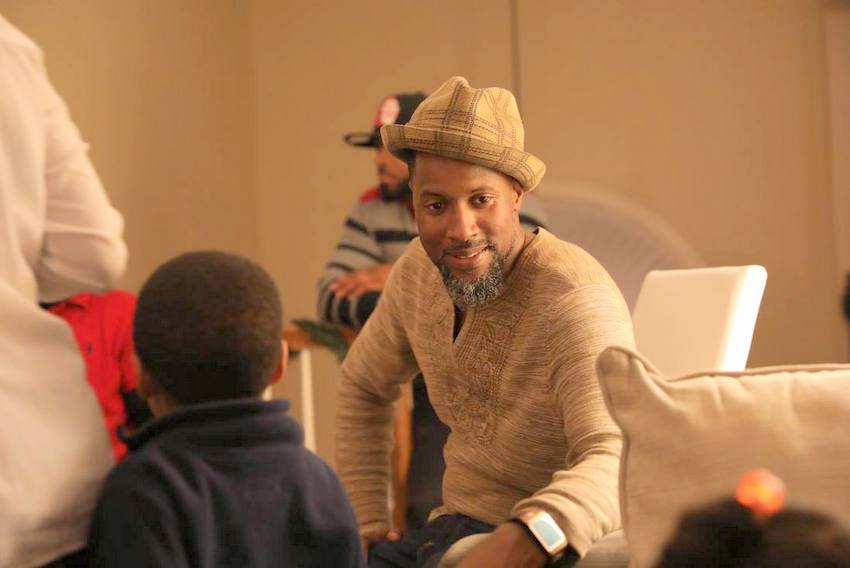
But first and foremost, my DP Mario “Master U” Jackson has always been the most critical component on the majority of all my projects. He typically travels from Tidewater Virginia for my projects on a Gotobus a couple of days early where we scout and plot out locations and run around picking up everything from gels to prop guns. So, while he never asks for producer credit on any of my films, he always earns it.
Also on this project, I got to work with an extremely talented sound man, Nick Mastorakis who believed in the project enough to drastically reduce his rate so that we could afford him for two days. His desire to be connected to this kind of work; work of social consequence meant a lot – and actually made the difference between going with him and other sound guys that I’d interviewed.
Beyond that, I definitely have to give a shout out to my two PA’s William O’Neal II and Keyona Jefferson (my nephew and niece) who traveled from Atlanta Georgia and Virginia to help out their uncle.
What are your personal experiences putting on all these hats/responsibilities (simultaneously)? Tell us about story, writing, and production?
Lawrence Watford (LW): When I was in film school I was extremely self-conscious about my filmmaking. I wasn’t a very organized producer and I never was able to grasp all the set etiquette and film terminology that some of my classmates seemed to have mastered, so I produced my first few student films on my own, without help from others purely out of fear of embarrassment. Eventually, wearing multiple hats became 2nd nature to me. It felt weird to watch my classmates write a film that they didn’t want to producer, or produce a film they weren’t directing or direct films that someone else would be choosing the takes for. Now, I have to do more relinquishing and trusting of others, but having a level of proficiency in these areas, I think makes me a stronger filmmaker.
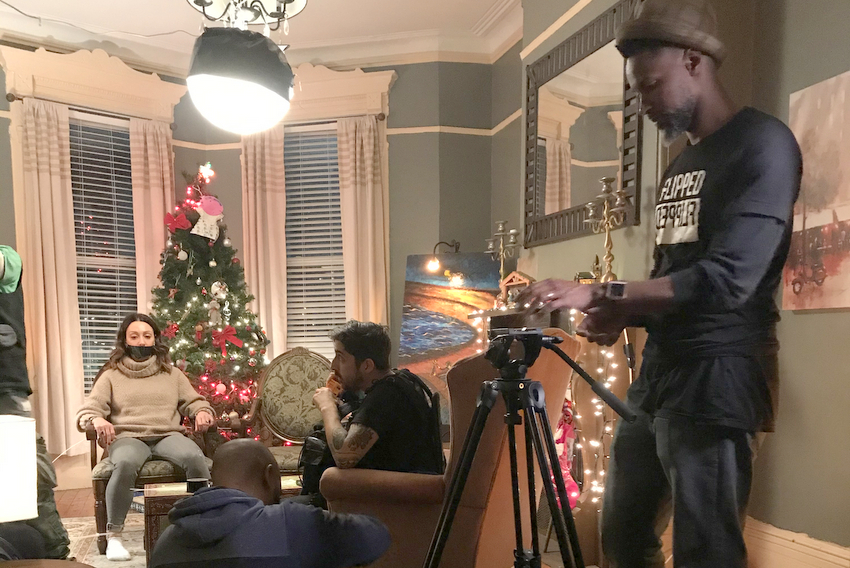
What is the source of the idea? How did the story develop from the idea? And how did the story evolve into a screenplay? Why do this story? Do you have a writing process?
LW: Unfortunately, the source material for the film is real life. We keep a running tally of black men and women being killed, unjustly by police. But beyond that, I really leaned into the idea after hearing a conversation where some older black folk were expressing their anger with police and sharing their own personal stories of being victimized. I felt like it was necessary to channel that into a real conversation about what happens when people become fed up enough with justice denied that they would dare to take it into their own hands. It was something I saw so clearly that I wrote the film in less than two hours.
Let’s talk pre-production: take us through a timeline of how you started and ended it?
LW: Pre-Production moved pretty fast. I completed the script on November 16th of 2019 and we were shooting on December 20th. I felt in my bones that this film needed to be made and that it had to be made before the end of the year, so I made sure that the script was small enough that a streamlined, intimate and elementary production process would not only work, but actually best serve the project.
What was your rehearsal process and period?
LW: Zip…Zilch… Nada… Two of my actors I knew as friends… The other three I met on the day and because we were shooting on video, we didn’t rehearse; we just shot and considered a “bad take” as the rehearsal. But that made the casting so important. I needed to cast people whose reels demonstrated they had the capability and the range for the rolls.
You shot the film in days. How long were your days?
LW: 2 days; 3 if you include the pick-up day after COVID.
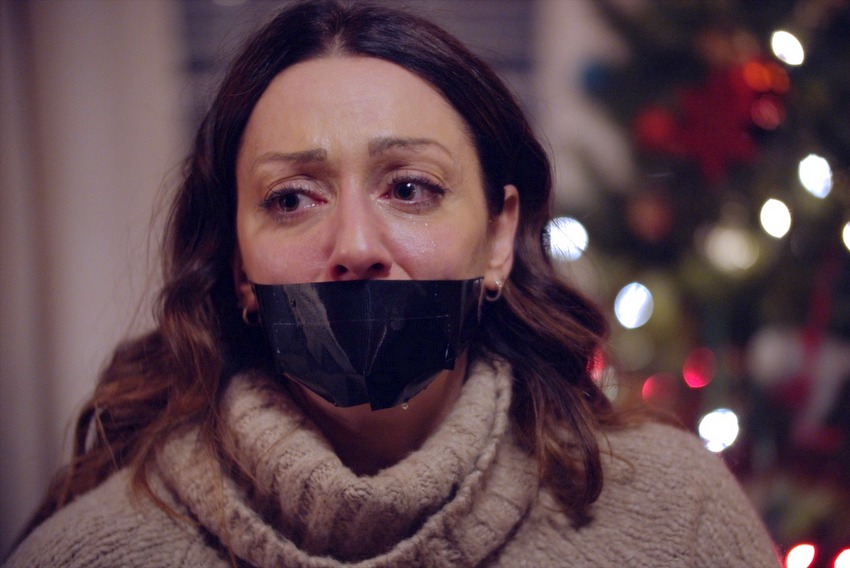
Did the tight shooting schedule make it harder or easier? How did it affect performances?
LW: The tight schedule didn’t necessarily make things harder, but meant we had to be more focused. It also meant that we had less time to spend resolving issues, so making sure there were no “issues” was a priority.
During the film production, what scene (that made the cut) was the hardest to shoot? And why?
LW: The most difficult scene to shoot was the living room scene, which is where all of the important dialogue occurs. For one, it was a really dramatic scene which required time and energy. In addition to that, there were 4 actors in play and we needed coverage of each of them so that we’d have options in the editing room. So that meant repeating this intensely dramatic scene over and over and hoping that the actors could still feel fresh when they’ve delivered for the 6th or 7th time.
What worked better in this latest production that mightn’t have worked so well in the last one you did?
LW: I can’t say that anything worked better on Catharsis that it did for Flipped. Part of that has to do with the planning. For Catharsis, we were prepared to work with less resources, so the script was written to accommodate that. For Flipped, we did a crowdfunding campaign that gave us the resources we needed to pull off a film with a larger scope. In that sense, each production had what was adequate to effectively execute the film.
What were the advantages and disadvantages in the way you worked?
LW: I’m a fluid thinker and I look to solve problems that would otherwise derail our vision. That way of thinking has always served me well. Rigidity tends to stifle imagination and creativity – and those are things that you definitely want to have as a filmmaker “bootstrapping” your project.
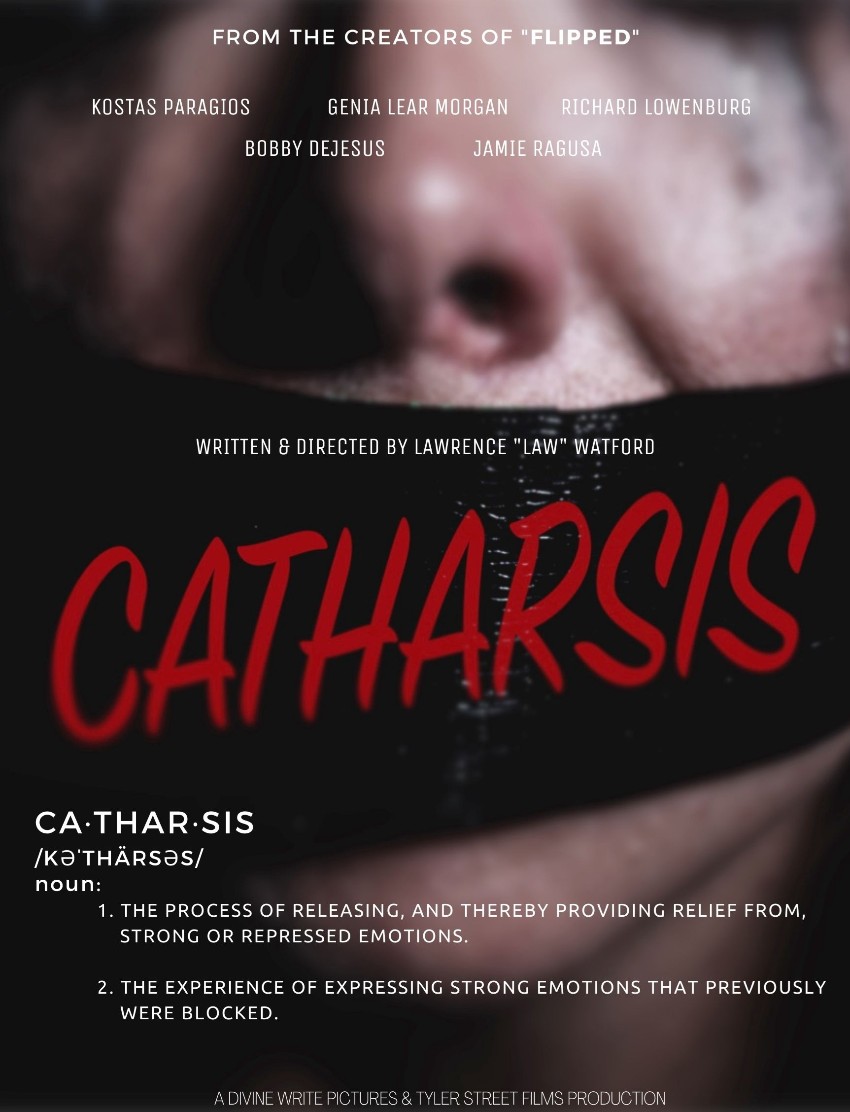
What was the experience like of working with a small shooting crew?
LW: I love small crews. Filmmaker Terrence Malick once told me that he liked smaller crews because the crews on these major sets felt “more like administration” than filmmaking. Small crews tend to value everyone more and that value is returned in the form of quality and dedication that comes from crew who are invested in the success of the project.
The film looks stunning. How did you get such a good look when shooting so fast?
LW: Fluidity and communication. Mario is a great DP and he knows that I’m going to challenge and push him – and he never fails. But in addition to that, he’s used to working on independent projects where you have to move fast and be creative to get the right look.
When did you form your production company – and what was the original motivation for its formation?
LW: Divine Write Pictures was officially established in 2013 when we created the film “The Savior & The Samaritan”. Before that I produced films under the name of the parent/holding company, Lawville Solutions. Lawville Solutions was created to be a corporate outfit, so creating Divine Write Pictures was an opportunity to make films under a more specific and deliberate creative and business mandate.
What was the first project out of the gate?
LW: The Savior & The Samaritan was a short film that used the biblical parable of “The Good Samaritan” to explore some pretty deep existential themes. It also set a tone for the kinds of films I wanted to make and the level of quality we wanted to display – despite being less resourced.
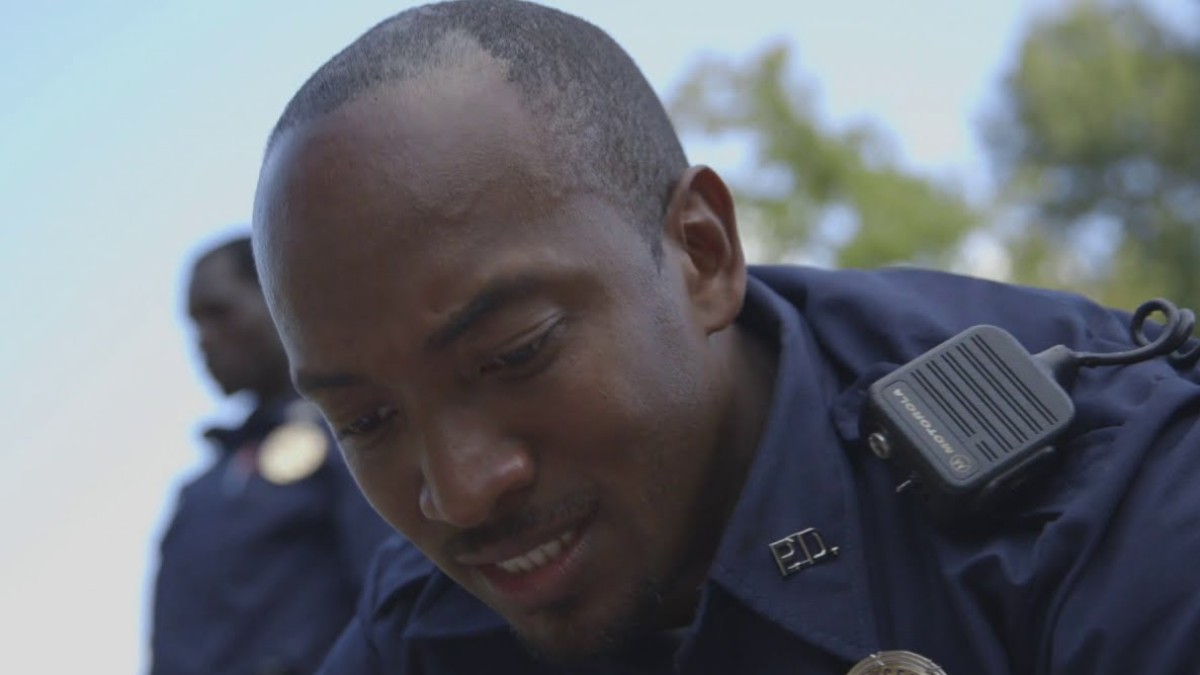
What about independent filmmaking and the business do you still struggle with?
LW: I love independent filmmaking, but I do struggle with gatekeepers. Figuring out how to convince people that your craft and skill is worth investing in is something that can be frustrating, especially on those occasions when you compare your work to some of the others out there in the studio system.
Where do you think your strengths lie as a filmmaker?
LW: I think my strength lies in my desire to humanize characters and to be open to various perspectives in doing that.
Let’s talk about finance. How did you finance the film?
LW: To my wife’s dismay; I self-funded. But I looked at it as an opportunity to bet on myself and my Tyler Street Films support system.
How much did you go over budget? How did you manage it?
LW: Honestly, I stopped counting. There reaches a point where you stop counting because you’ve gone so far with the project that whatever you need to finish strong is what you’re going to get to finish strong. That said, I didn’t go enough over budget for it to worry me. The irony is that the real cost of the project has been the marketing.
How important is marketing? Talk about the festival tour? Do you think a project can make a dent without it nowadays?
LW: Marketing is HUGE. I wish it wasn’t as much of a priority, but I have spent as much on the marketing as I did on the film. And that is with the hope that the project shows up on the radar of the agents, managers and studios, and puts my name in the conversation.
Tell us about marketing activities or efforts on this project – and how it worked or didn’t work?
LW: The main marketing activity involved my publicist relentlessly reaching out to various news outlets and blogs to pitch the narrative we’d created around the film. It’s definitely paid off because after a month or so the actual novelty of the film dies off, but media coverage is able to revive it for a spell and create an opportunity to turn the conversation from the film to the filmmaker.
What do you hope audiences will get from the presentation of your film?
LW: I honestly want them to think “Oh, damn. What if?…” I want to shit the conversation from justice denied to justice taken because I believe that the “failure of imagination” keeps us at the status quo.
What else have you got in the works?
LW: I have some projects that I’m hoping will take off. On the features side, I have a Donald Trump inspired romantic comedy that I’d love to be able to move into active development – if only to shoot something fun and light. On the television side, I have a number of projects being developed either exclusively in house or in collaboration with/under Tyler Street Films and The Write Brothers.
Tell us what you think of the Case Study for CATHARSIS. What do you think of it? Let’s have your comments below and/or on Facebook. Or join me on Twitter.
Follow Lawrence Watford on Social Media
Website
IMDb
LinkedIn
Twitter
Instagram
YouTube
MORE STORIES FOR YOU


